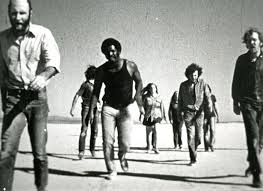In a strong New York Times Book Review piece, George Packer surveys the common ground shared by disparate pundits Chris Hedges, a revolutionary on the Left, and the Libertarian-ish Charles Murray, who claims to love both meritocracy and Sarah Palin, go figure. In new titles by each author (here and here), Packer reads the dissatisfaction in America that wasn’t quelled by the evanescence of Occupy, the white-hot anger of the Tea Party or the Presidency of Barack Obama. At the root of this multi-ideological discontent is a stinging anti-government strain, powered by the belief that the system is rigged, if for different reasons. Packer, however, is left wanting by both books.
His opening:
A few years ago, it wasn’t hard to find Americans who thought a revolution was coming. At the depths of the recession, in hard-hit places like the North Carolina tobacco country or the exurbs of Tampa Bay, I met plenty of people who believed we were one power blackout or gas shortage away from civil unrest, political violence, even martial law. The feeling didn’t conform to strictly partisan lines, and the objects of wrath included bêtes noires of both the left and the right: banks, oil companies, federal and state governments, news media. At Zuccotti Park in Lower Manhattan, a Tea Party couple visiting from rural Virginia was surprised to find a patch of common ground with Occupiers — at least until the discussion turned to actual policies. The anger was populist, which is ideologically capacious. The enemy was bigness, feathering its own nest and conspiring against the little guy.
The revolution didn’t come — it never does in America, not since the first one, no matter how bad things get. The Tea Party reared up, only to be appropriated by billionaires and partly dissolved into the Republican Congress. Occupy Wall Street flashed across the sky and flared out, more a meme than a movement. I once asked a man in Tampa Bay — formerly middle class and owner of his own small business, he was without work, facing foreclosure and dying of cancer — why there was no mass movement of Americans in his situation. “Imagine getting up every day and not having a purpose,” he said. “You’re not working, your self-worth goes down the toilet. You don’t interact with people. You stay in your house. You don’t want to answer the phone. It isolates you.” He seemed to be saying that in America failure, like success, feels personal.
But the collective discontent hasn’t gone away — far from it.•


